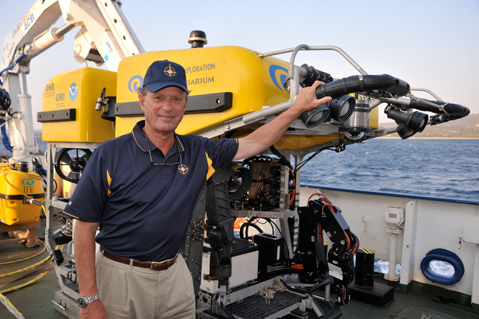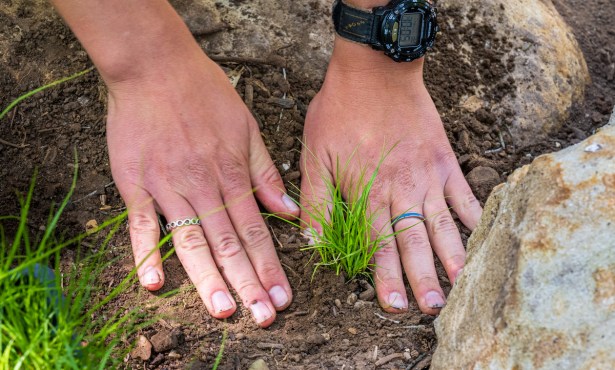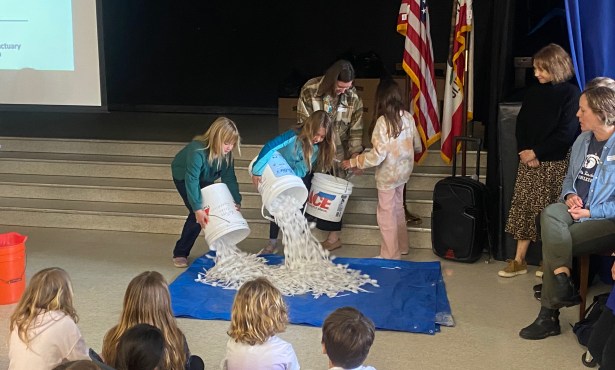Robert Ballard’s New Adventures in Exploration
Famed Oceanographer Comes to UCSB as Part of A&L’s National Geographic Live Series

In 1985, Dr. Robert Ballard became an international name when he and his crew discovered the sunken wreckage of the Titanic splintered across the ocean floor. Although he’d spent decades surveying the wonders of the seas, his work had never before garnered attention outside the science community. “I got 15,000 letters from kids in a matter of days,” he said in a recent phone conversation. “I’d done some heavy-duty science — like studying thermal vents, the origin of life on Earth — but I never got letters. But when I found this rusty old ship, and I got inundated, and I thought maybe we can turn this tragedy into something [educational].”
Four years later, Ballard created the JASON Project, whose mission is “to inspire and educate kids everywhere through real science and exploration” by providing “multimedia curricular experiences in science, technology, engineering, and math (STEM).” Today, Ballard still believes engaging youth is fundamental to our survival.
After finding the Titanic, you really moved into an educational aspect of your work. I started the JASON Project 25 years ago. We’ve had about 15 million kids go through it. We have 2 million kids in the program right now. We have over 100,000 kids right now in Boys’ and Girls’ Clubs. We have zillions in museums, aquariums and science centers, and then our National Geographic specials … We’re really trying to get kids wanting to be scientists and explorers and engineers. We believe it’s not about selling science; it’s about selling scientists and engineers, and we create a team that reflects the demographics of the country. For example, I’ve mandated that 55 percent will be women, in positions of leadership and authority.
Why do you feel that’s so important? [Laughs.] Given the lifestyle of Americans, if we don’t do it, we’re gonna be left in the dust. We’re only 5 percent of the population of the planet, and so unless we are competitive, we are toast … We need people who are developing patents and dreaming up new things and are in the driving engine of ingenuity that feeds a nation. So we can’t just have people being lawyers, and we can’t have people just being doctors and taking care of sick people. We have to be on the front lines of productivity. Everyone’s born a scientist if they want to know, “Where am I? What’s going on here?” And our goal is to not let that flame of curiosity be extinguished.
So you aren’t a research ship, but exploratory. We open-source our data as we collect it, which is heresy within the academic world … We have something that’s called Doctors on Call, which is this amazing telecommunication technology that allows us to replicate the ship’s bridge wherever we want … We give the remote command centers a call if something’s going on and say, “Boot up your laptop to take a peek.” Since we don’t know everything, we want to access [experts] and get a consensus of whether [what we are viewing] is important or not.
What new adventures are you pursuing? Oh my god, they’re never ending. I’m really having fun bringing the next generation online …. I created my own trust, the Ocean Exploration Trust [oceanexplorationtrust.org]. Our [mission] is to go where no one else has gone on planet Earth [such as the ocean].
4•1•1
Robert Ballard will speak about his new adventures in deep-sea exploration Sunday, April 27, 3 p.m., at UCSB’s Campbell Hall as part of Arts & Lecture’s National Geographic Live program. Tickets are $25 (general), $15 (youth and UCSB students). For information, call 893-3535 or visit artsandlectures.sa.ucsb.edu.



